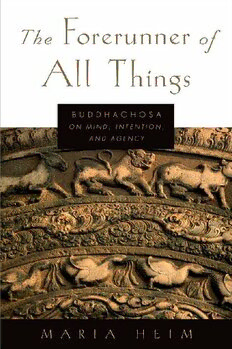
The Forerunner of All Things: Buddhaghosa on Mind, Intention, and Agency PDF
Preview The Forerunner of All Things: Buddhaghosa on Mind, Intention, and Agency
The Forerunner of All Things This page intentionally left blank The Forerunner of All Things Buddhaghosa on Mind, Intention, and Agency z maria heim 1 3 Oxford University Press is a department of the University of Oxford. It furthers the University’s objective of excellence in research, scholarship, and education by publishing worldwide. Oxford New York Auckland Cape Town Dar es Salaam Hong Kong Karachi Kuala Lumpur Madrid Melbourne Mexico City Nairobi New Delhi Shanghai Taipei Toronto With offi ces in Argentina Austria Brazil Chile Czech Republic France Greece Guatemala Hungary Italy Japan Poland Portugal Singapore South Korea Switzerland Thailand Turkey Ukraine Vietnam Oxford is a registered trademark of Oxford University Press in the UK and certain other countries. Published in the United States of America by Oxford University Press 198 Madison Avenue, New York, NY 10016 © Oxford University Press 2014 All rights reserved. No part of this publication may be reproduced, stored in a retrieval system, or transmitted, in any form or by any means, without the prior permission in writing of Oxford University Press, or as expressly permitted by law, by license, or under terms agreed with the appropriate reproduction rights organization. Inquiries concerning reproduction outside the scope of the above should be sent to the Rights Department, Oxford University Press, at the address above. You must not circulate this work in any other form and you must impose this same condition on any acquirer. Library of Congress Cataloging-in-Publication Data Heim, Maria, 1969– The forerunner of all things : Buddhaghosa on mind, intention, and agency / Maria Heim. pages cm Includes bibliographical references and index. ISBN 978–0–19–933104–8 (pbk. : alk. paper)—ISBN 978–0–19–933103–1 (cloth : alk. paper) 1. Karma. 2. Theravada Buddhism—Doctrines. 3. Buddhaghosa. I. Title. BQ4435.H45 2013 294.3’422—dc23 2013008728 1 3 5 7 9 8 6 4 2 Printed in the United States of America on acid-free paper For Steve Mind is the forerunner of all things. Mind is chief, and they are mind-made. If one speaks or acts with a wicked mind, suff ering follows even as the cartwheel follows the hoof of an ox. Mind is the forerunner of all things. Mind is chief, and they are mind-made. If one speaks or acts with a pure mind, happiness follows even as one’s shadow stays near. — dhammapada 1,2 Contents Acknowledgments i x Abbreviations x i Introduction 1 1. Constructing Experience: Intention in the Suttas 34 2. The Work of Intention: Mental Life in the Abhidhamma 83 3. Culpability and Disciplinary Culture in the Vinaya 132 4. Making Actions Intelligible: Intention and Mind in Stories 181 Conclusion 217 Bibliography 225 Index 239 This page intentionally left blank Acknowledgments o ne of my favorite passages in the Pāli canon has (cid:2)n anda declaring that “half” the good life is friendship with good people, companionship with good people, and closeness with good people, only to be corrected by the Buddha to the eff ect that these constitute not half, but the whole of the good life (S.v.2). The passage is speaking of the religious life, but I have found that the Buddha’s affi rmation of friendship with wise and help- ful teachers is true for the intellectual life as well. My gratitude for such intellectual friendship must go fi rst to Charlie Hallisey for his sage advice over many years, his care for my intellectual development, his perceptive reading of draft chapters, and his sharing with me his Harvard course on Buddhaghosa and Buddhist commentaries. This project progressed only through the thoughtful guidance of many friends and colleagues who participated in the various forums in which parts of it were presented, including a workshop at Amherst College, “Contours of the Moral Person”; the Five College Buddhist Studies Faculty Seminar; the Harvard Divinity School lecture series and conference, “Moral Worlds and Religious Subjectivities”; and insightful audiences at Indiana University and University of Pennsylvania. More specifi cally, I am very grateful to Beatrice Chrystall, Sarah LeVine, Steven Collins, Lilian Handlin, Jock Reeder, Janet Gyatso, Georges Dreyfus, and Jonathan Schofer for reading parts or all of the manuscript, in several cases more than once. I am also very grateful for conversations with Aaron Stalnaker and David Wills. Toward the end of the project, I benefi ted from discussions with Buddhist scholars and neuroscientists at a workshop in Telluride (John Dunne, Thupten Jinpa, Richard Davidson, and others) and at the Mind and Life Summer Research Institutes. Many thanks also to Jay Garfi eld for the time and meticulous care he put into the project reading drafts and helping me shepherd it through its fi nal stages.
